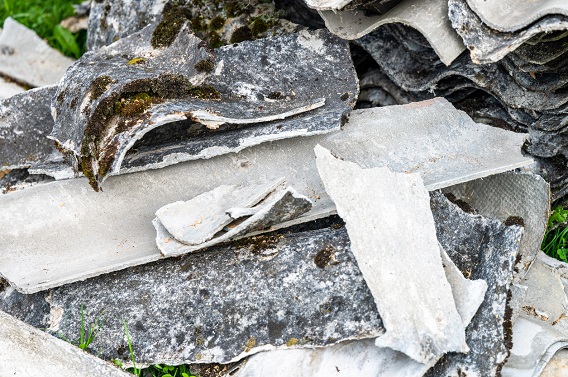Companies Fined $825K for Improper Asbestos Handling
Legislation & LitigationWritten by Travis Rodgers | Edited By Amy Edel

Massachusetts Attorney General Andrea Joy Campbell is imposing fines totaling $825,000 against several companies for improper handling, disposal and removal of materials containing asbestos. Since 2016, the AG’s Office has imposed more than $7.7 million in civil penalties.
Among those included in recent consent judgments are the Pilgrim Nuclear Power Station in Plymouth, a redevelopment site in Lowell and a residential development project in the Mission Hill neighborhood of the City of Boston. The Worcester County Sheriff’s Office also found itself the subject of an AGO case over requiring employees to demolish asbestos-containing flooring at the Worcester County Jail and House of Corrections.
Employees had been required to remove the asbestos products without following the Massachusetts Department of Environmental Protection’s asbestos regulations. The Sheriff’s office is now required to implement a comprehensive asbestos management plan, conduct an audit to identify any additional asbestos in the facility, establish an asbestos code of conduct and provide confidential medical examinations to those potentially exposed to asbestos. If the Sheriff’s office fails to comply, a fine of $125,000 will be imposed.
In February, the AG also filed a lawsuit against Holtec Decommissioning International for a number of violations in connection with the company’s mishandling of asbestos-contaminated debris following the demolition of a nuclear power plant in Plymouth. According to the complaint, Holtec left the asbestos materials in ripped garbage bags on top of open dumpsters in the work area and in a shed, violating state regulations.
Asbestos Safety Initiative
Attorney General Campbell launched “Healthy Buildings, Healthy Air” in 2017, and asbestos safety is a priority of the initiative. The AGO partners with state education, labor and environmental agencies to raise awareness about asbestos and enforce safe asbestos management to ensure public safety.
“Asbestos is a significant threat to our residents’ health and environment,” Attorney General Andrea Joy Campbell said. “Those that fail to follow the law when it comes to the handling and disposal of it put everyone — workers, residents, and the public — at risk. My office will continue to hold these bad actors accountable.”
Commissioner Bonnie Heiple of the Massachusetts Department of Environmental Protection added, “Asbestos regulations are in place to protect the public and can neither be ignored nor taken lightly. It is vital that companies and individuals properly identify and remove asbestos materials before beginning any renovation project. As these cases demonstrate, failure to follow the rules will result in significant penalties, as well as escalated cleanup and decontamination costs.”
Asbestos Products and Exposure Risks
For decades asbestos was widely used as a building material in floor tiles, cement, adhesives, sealants, paint, reinforced plastics and roofing materials. Older homes and schools built before the 1980s likely pose a risk of asbestos exposure.
During construction, renovation or demolition projects, asbestos can be disturbed, posing a danger of inhalation and the risk of developing an asbestos-related disease. Only a licensed asbestos abatement company should handle asbestos removal. These experts will test for asbestos and follow strict regulations and guidelines. Professionals will also have the proper equipment to remove and handle asbestos in the safest way possible, reducing the risk of exposure and illness.
Asbestos-related diseases such as mesothelioma have a long latency period and symptoms may not present until decades after the exposure took place. Asbestos is still the leading cause of work-related deaths worldwide.
While asbestos has been banned in some countries, there still is no asbestos ban in the U.S. Its use has been phased out of most products, but there are still asbestos-containing products imported into the country that contain asbestos, according to the EPA and reported in the U.S. Geological Survey’s Mineral Commodity Summaries, January 2024.
Known Asbestos-Containing Imports as of 2020
- Brake blocks: Used in the oil industry.
- Friction products: Used in some vehicles.
- Preformed gaskets: Used in the exhaust system of a specific type of utility vehicle.
- Rubber sheets: Used for gasket fabrication, primarily to create a chemical containment seal in the production of titanium dioxide.
The Geological Survey reports: “Domestic consumption of chrysotile was estimated to be 150 tons in 2023; all consumption was from stockpiles, as no chrysotile was imported based on data available through September. The chloralkali industry, which uses chrysotile in nonreactive semipermeable diaphragms that prevent chlorine generated at the anode of an electrolytic cell from reacting with sodium hydroxide generated at the cathode, has accounted for 100% of U.S. asbestos fiber consumption since no later than 2015.”While in the first 9 months of 2023, the chloralkali industry didn’t report any imports in just the first 3 months of 2022, the industry imported 114 metric tons of raw asbestos. The dramatic rise in imports in 2022 left stockpiles that were used in 2023. According to The Geological Survey, asbestos diaphragms were used in 8 chloralkali plants in the U.S. in 2023. Of the 8 plants currently using asbestos, 3 are reportedly transitioning to alternative materials.






